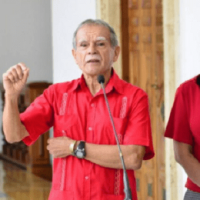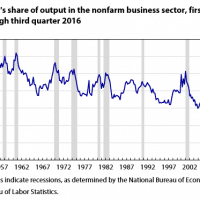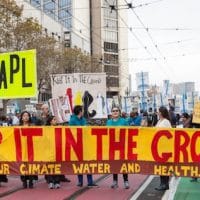-
Oscar Lopez Rivera calls U.S. intervention in Puerto Rico ‘biggest experiment in neoliberalism’
Oscar Lopez Rivera, the anti-colonial leader from Puerto Rico, has criticized the United States’ callousness and “experimental” approach towards the U.S. colony.
-
U.S. workers and their decades of lost earnings
It happened gradually, but thanks to the U.S. media, economic news has largely been reduced to stock market reporting. Want to know how the economy is doing? Check the S&P 500 Index. Want to know whether the latest Trump proposal is good or bad? Check the S&P 500 Index.
-
The robot, unemployment, and immigrants
For every industrial robot introduced into the workforce, six jobs are eliminated. – Since a few days, Amazon has started Amazon Go. The idea is simple: a shop where you go in, take whatever you want from the shelves, and the cost goes automatically to a magnetic card that you carry.
-
The fight over free speech on campus
On university campuses around the world, “free speech” is becoming the favourite slogan of the right, sure to be raised during campus political controversies.
-
Movements of millions say no to gene drives as Brazil attempts to legalize genetic extinction technology
The largest rural movements in Brazil, representing well over a million farmers, are protesting a new Brazilian regulation that would allow release of gene drives, the controversial genetic extinction technology, into Brazil’s ecosystems and farms.
-
Sunday suspense
Only one force is genuinely suited to exposing the lies and redirecting emotions away from attacks on the poorest victims and towards solidarity with them against the truly guilty forces on high. It is the Left.
-
Is equality enough?
Race/isms Book Forum is a new series aimed at bringing established and emerging voices together in conversation around recent work that critically engages our world’s racial scripts, past and present. The structure of the forum is straightforward. We invite three to four thinkers to grapple with a book, highlighting a section of it, and then provide the author(s) an opportunity to respond however they see fit.
-
Globalization and U.S. labor’s falling share of national output
The decline in the payroll share of output is class power at work: unfortunately theirs, not ours.
-
Finding ways to be one: The making of Cedric J. Robinson’s radical Black politics.
Historian Robin D.G. Kelley explores the radical Black politics of scholar Cedric J. Robinson—from his historical understanding of race and capitalism as inherently inseparable systems, to his vision of the possibilities of politics, rooted deep in struggles past and present.
-
Janus and fair share fees
Over the last decade, a number of cases attacking the rights of public-sector union members have been quietly working their way through the courts and, finally, up to the U.S. Supreme Court.
-
School shooting: a U.S. epidemic
How does the rate of school shootings in the U.S. compare with countries where is more difficult to obtain guns?
-
Will Lebanon be the next energy war?
In 2010 the oil and gas geopolitics of the Mediterranean changed profoundly. That was when a Texas oil company, Noble Energy, discovered a huge deposit of natural gas offshore Israel in the Eastern Mediterranean, the so-called Leviathan Field, one of the world’s largest gas field discoveries in over a decade.
-
Mapping social reproduction theory
Let us slightly modify the question “who teaches the teacher?” and ask this of Marxism: If workers’ labor produces all the wealth in society, who then produces the worker? Put another way: What kinds of processes enable the worker to arrive at the doors of her place of work every day so that she can produce the wealth of society?
-
Are intersectionalism or Afro-Pessimism paths to power? (Part 3 of 3)
In parts one and two of this series I’ve talked about the fact that there are two conflicting versions of intersectionality, one employed by some honest to god leftists who reach backward across decades to ventriloquize the term into the mouths of the Cohambee comrades, of Audre Lord, even of Claudia Jones and Sojourner Truth, and how this exists alongside another, hegemonic version of intersectionality deployed by the corporate funded lawyers, media and the nonprofit sector which invented the term in the first place for reasons Cohambee or Claudia Jones would never touch.
-
Escalation of imperialist aggression against Venezuela
Venezuelanalysis republishes this analysis of the current conditions in Venezuela from Lucha de Clases, in which they call for deeper revolutionary measures as a way out of the current economic crisis.
-
Conservative-led anti-protest legislation already doubled since last year
Last March, the NLG shared an overview and analysis of the wave of anti-protest legislation sweeping state legislatures across the country. At the time, we were looking at 25 bills proposed in 19 states—all focused on limiting the right to protest or removing liability for harm caused to protesters. One year later, the number of anti-protest bills has reached 58 in 31 states with no end in sight.
-
There is no such thing as a natural disaster
“Instead of considering these [events] as natural disasters we should be calling them humanitarian disasters with a natural trigger, where this natural trigger ignites and exaggerates the structural inequalities that capitalism produces along racialized, gendered, and class lines.”
-
Driverless trucks are wiping out jobs
Driverless trucks are on the way sooner than most workers realize, as corporations seek to raise profits by cutting labour costs. Media reports indicate that investors and researchers agree that tech change in the trucking industry will soon replace 1.7 million jobs in the U.S., where trucking was the most common job in 28 states in 2014. Some predict that pay rates for the remaining human drivers will fall rapidly from the current average annual of $42,500. The jobs of another 1.7 million taxi, bus and delivery vehicle drivers are also at stake.
-
Trump lays bare U.S. support for ethnic cleansing of Palestine
For 25 years, since a fateful handshake between former Palestine Liberation Organisation (PLO) leader Yasser Arafat and Israeli PM Yitzhak Rabin on the White House lawn ushered in the Oslo Accords, supporters of a single, democratic and secular state between the Jordan River and the Mediterranean Sea have been pilloried.
-
Making everyone happy
After four and a half months of haggling and recrimination and, four days past the deadline, an all-night session, the three parties had finally settled on a coalition government program—179 pages long.



















